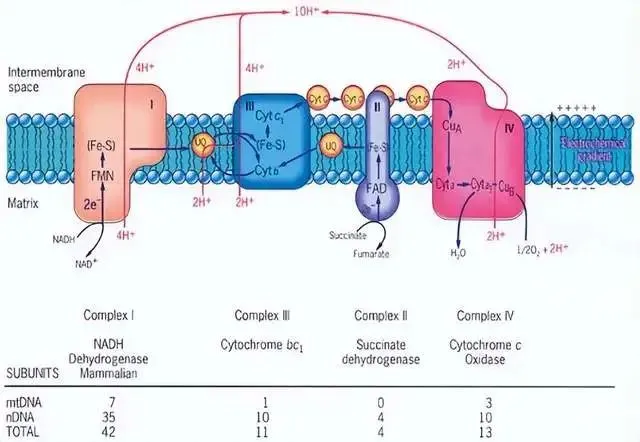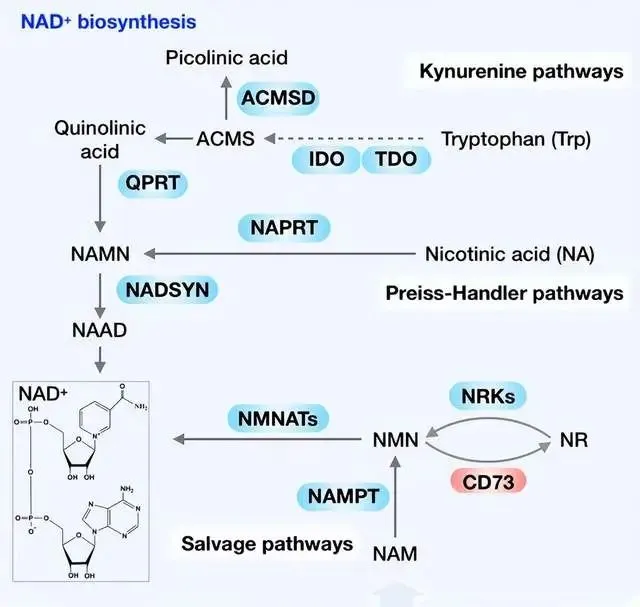Abstract
Imbalances in NAD+ homeostasis have been linked to aging and various diseases. Nicotine, a metabolite of the NAD+ metabolic pathway, has been found to possess anti-inflammatory and neuroprotective properties, yet the underlying molecular mechanisms remained unknown. Here we find that, independent of nicotinic acetylcholine receptors, low-dose nicotine can restore the age-related decline of NAMPT activity through SIRT1 binding and subsequent deacetylation of NAMPT, thus increasing NAD+ synthesis. 18F-FDG PET imaging revealed that nicotine is also capable of efficiently inhibiting glucose hypermetabolism in aging male mice. Additionally, nicotine ameliorated cellular energy metabolism disorders and deferred age-related deterioration and cognitive decline by stimulating neurogenesis, inhibiting neuroinflammation, and protecting organs from oxidative stress and telomere shortening. Collectively, these findings provide evidence for a mechanism by which low-dose nicotine can activate NAD+ salvage pathways and improve age-related symptoms.
Recently, a study published in the international journal Nature Communications has garnered widespread attention. The research team introduced trace amounts of nic (2μg/mL) into the drinking water of mice, allowing them to ingest extremely low doses of nic through drinking. The study results revealed that long-term consumption of trace ni water significantly improved NAMPT activity and NAD+ synthesis, leading to enhancements in male mice's glucose metabolism, cognitive function, and the alleviation of aging-related symptoms.
This study has raised a crucial question: can nic delay aging in humans? Does smoking contribute to longevity?

Nicotine Promotes NAD+ Synthesis:
Research indicates that trace amounts of nic can stimulate NAD+ synthesis, contributing to the improvement of cellular function and metabolism, and potentially offering benefits for delaying aging.
Lower Addiction Potential of Nicotine E-Cigarettes:
Compared to traditional tobacco, nic e-cigarettes are considered to have lower addictive properties, meaning individuals may find it easier to control their NIC intake and reduce smoking frequency.
Reduced Inhalation of Harmful Substances:
Low-concentration nic vape do not contain harmful substances found in tobacco smoke such as tar and carbon monoxide, reducing health risks associated with smoking, particularly for cardiovascular health.
Potential Anti-Aging Effects:
Low-concentration nic e-cigarettes may help improve intracellular NAD+ levels, a molecule associated with anti-aging. By enhancing NAMPT activity, nic can theoretically promote NAD+ production, as demonstrated in some experimental studies. NAD+ plays a crucial role in regulating cellular metabolism and repair processes. By maintaining healthy cellular metabolism, nic may help mitigate cellular damage associated with aging.

Enhancement of Cognitive Function:
Research suggests that low-concentration nic e may contribute to improved cognitive function. Some symptoms of dementia are linked to reduced NAD+ levels and disrupted cellular metabolism. Thus, by increasing NAD+ levels, NIC may help protect the brain from cognitive decline.
Possible Anti-Inflammatory Effects:
Certain inflammations are closely related to the aging process. Some studies suggest that nicotine may have anti-inflammatory properties, lowering chronic inflammation levels. By reducing inflammation, nicotine might contribute to delaying some age-related health issues.
Potential Research Opportunities:
This study offers scientists a new research direction to delve into the effects of low-concentration nicotine on NAD+ levels and anti-aging. This holds promise for advancing the field of anti-aging research.
Possibly Beneficial for Metabolism and Weight Management:
Some studies propose that nicotine may have effects on weight control and metabolism. Maintaining a healthy weight and metabolism in older individuals may positively impact longevity and the delay of aging.
Potential Anti-Depressant Effects:
Some research indicates that nicotine may possess anti-depressant effects, which can be particularly relevant as depression is common among older adults. Alleviating depressive symptoms can improve the quality of life and support mental health maintenance.
Consider Low-Nicotine E-Cigarettes for a Balanced Approach:
If you are intrigued by the potential benefits of low-concentration nicotine and are a current smoker or someone looking to explore safer alternatives, consider trying low-nicotine e-cigarettes. The devices Mon G20 2500 Puffs offer a controlled and customizable way to experience nicotine without the harmful byproducts of traditional smoking. However, always remember to prioritize your health and well-being, and consult with a healthcare professional before making any significant changes to your smoking habits.





